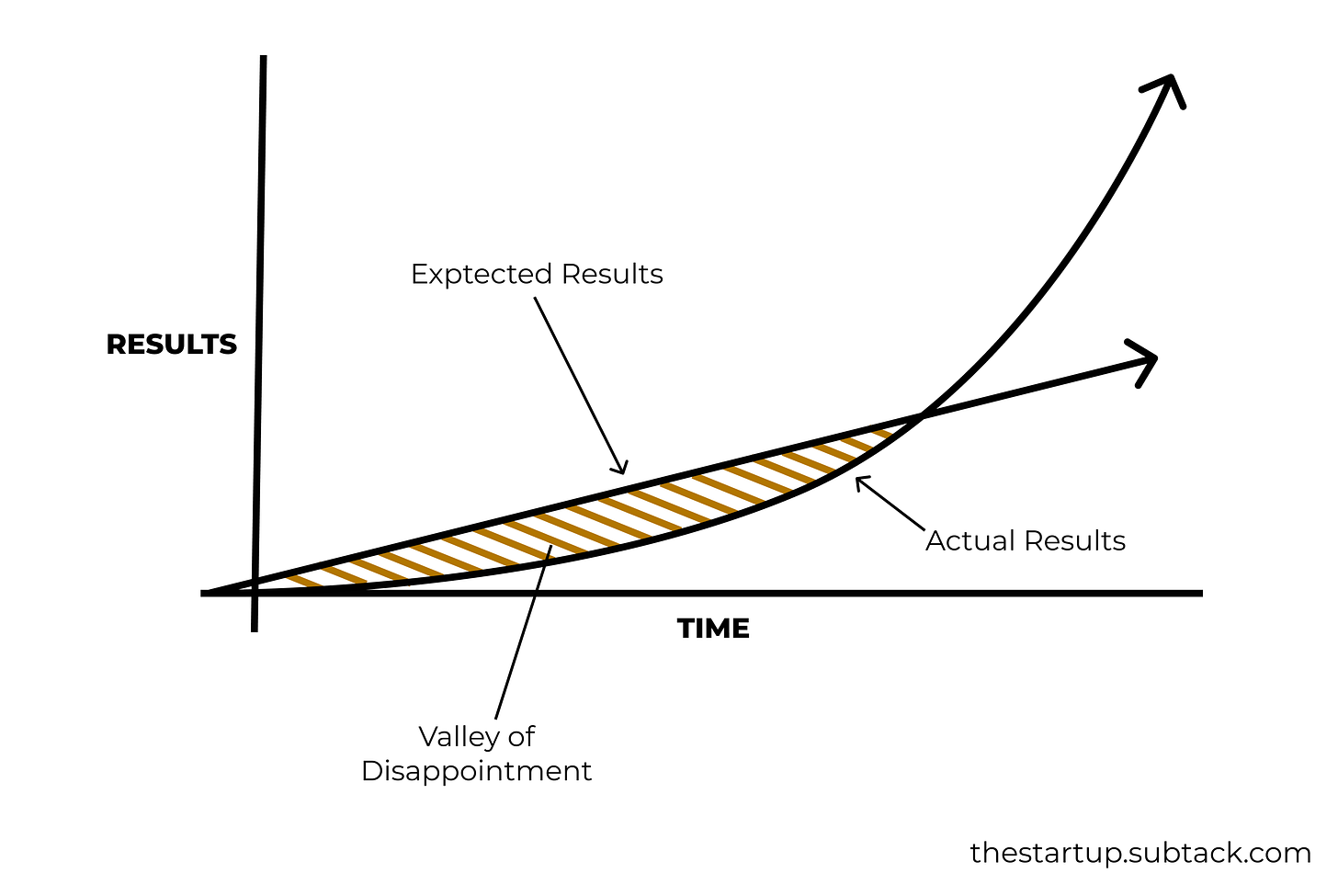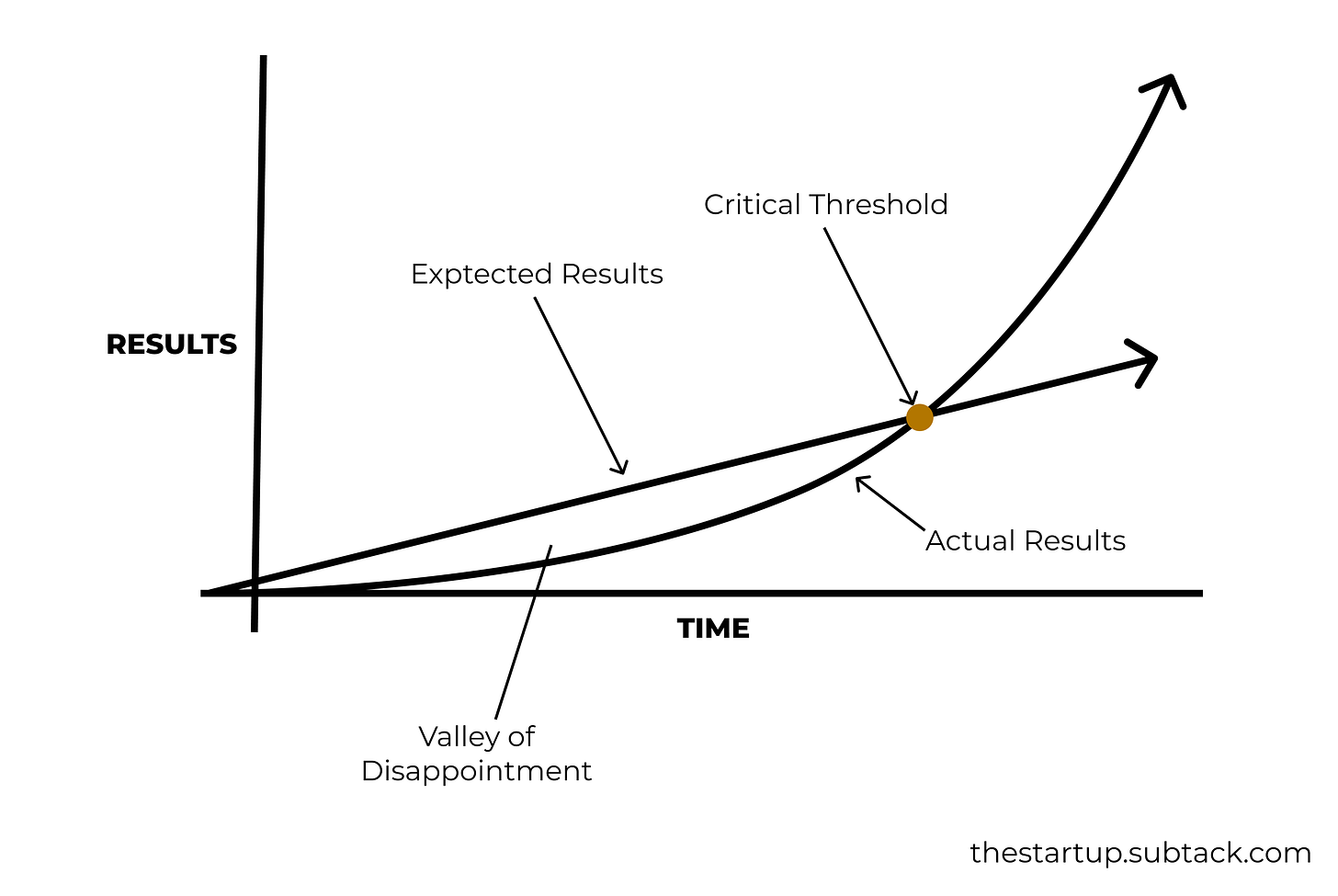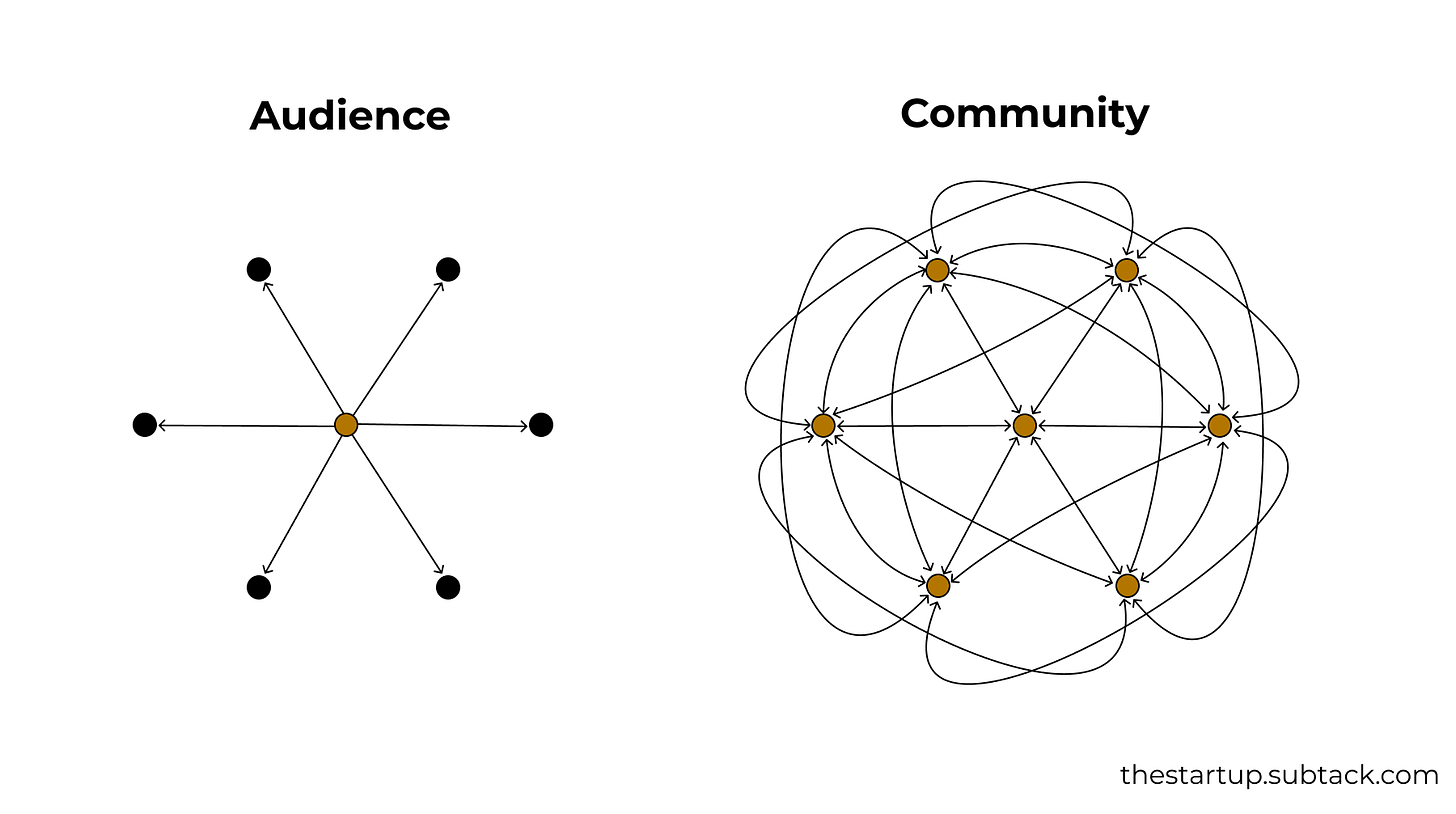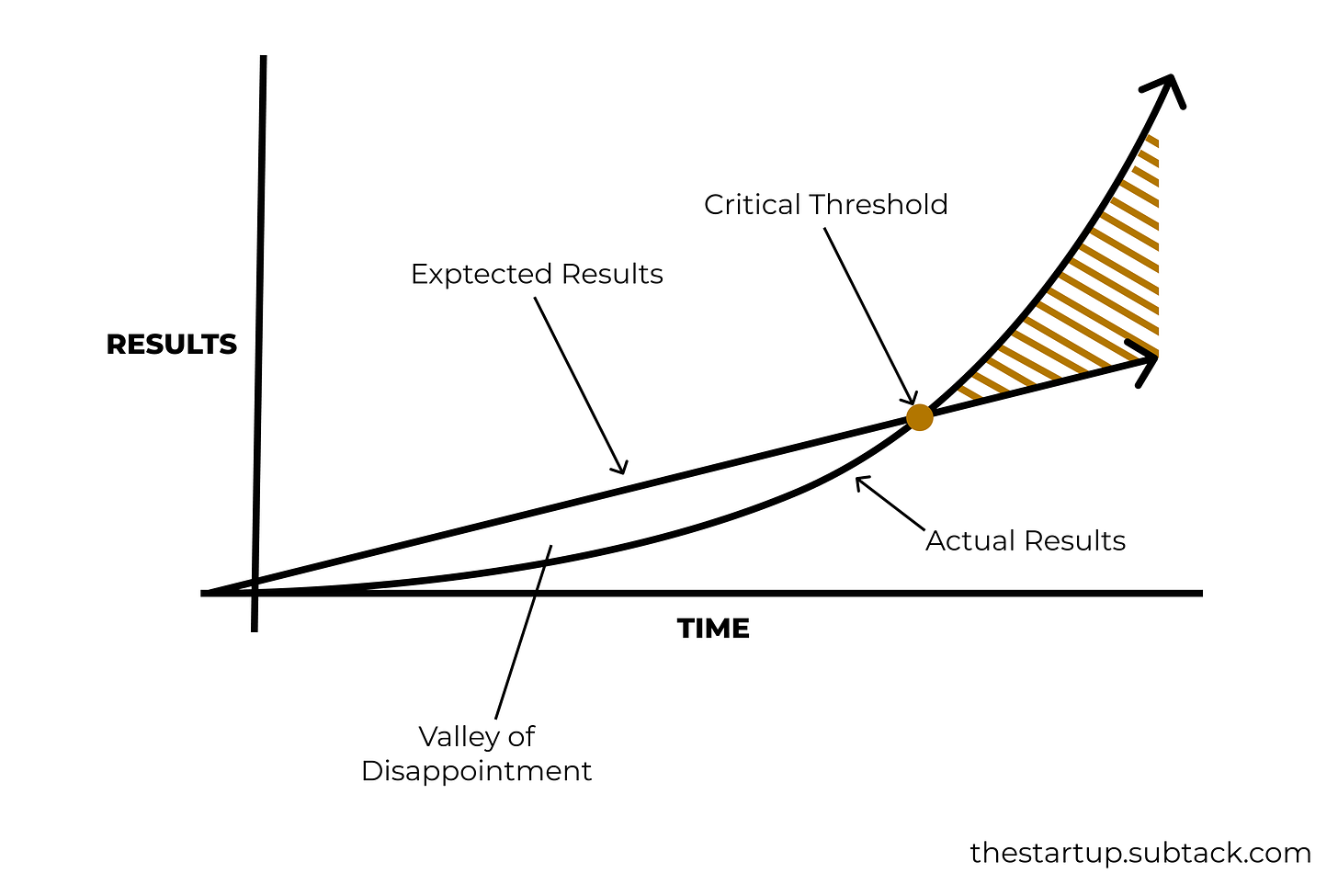Consistency - Reflections from Atomic Habits by James Clear (#5 - The Startup)
Originally posted at: thestartup.substack.com
If you like it, please: Share & Subscribe
Since starting this newsletter, giving up has crossed my mind regularly. The reasons vary. Yet, they sound exactly like the ones that crossed my mind when I started working out, building a company, driving, coding, etc.
Difficulty
Unfulfilled Expectations
“Most people overestimate what they can do in one year and underestimate what they can do in ten.” – Bill Gates.

We’re always disappointed at the initial progress when started something new. Most of us quit during the valley of disappointment because we don’t believe in the power of consistent marginal improvements.
Fear
The fear of failure often prohibits consistency. It makes us more uncertain about whether we can succeed. But, consistency is the perfect medicine for doubt.
“When people talk about trying to suppress your fear … I mean, I look at it differently. I try to expand my comfort zone by practising the moves over and over again.” - Alex Honnold.
“It is not because things are difficult that we do not dare, it is because we do not dare that they are difficult.” - Seneca.
How To Improve Consistency?
The key is to keep going long enough to hit the “Critical Threshold” - the point our results, finally meet our initial expectations.

Below, I’ve detailed a few way’s to improve our commitment until (and beyond) this point.
Social Contracts
Making yourself accountable to people encourages you to persist.
Startups are increasingly documenting their developments publicly (i.e. #BuildInPublic) for this reason too. Public accountability motivates us to be consistent. We also see this with other communities (e.g. #100DaysOfCode and #100DaysOfNoCode).
Find Partners
Taking it one step further, you can find a partner or community. They won’t just listen to your aspirations but will place clear expectations on you.
Want to work out? Get a gym partner.
Want to read more? Find a book club.
Want to build a company? Join a mastermind group or get a co-founder.
This community/partner will help you overcome the valley of disappointment.
“If you want to go fast, go alone. If you want to go far, go together.” - African Proverb

Reduce Friction
In Atomic Habits, James Clear argues that we prefer habits that are most:
- Obvious
- Easy
- Attractive
- Satisfying
If you want to become more consistent, then make the option more preferable by leveraging the above.
Identity Change
Our actions ultimately result from our beliefs about ourself. Fear hinders us from believing we’re genuinely the people we aspire to be. I feared my numerical background prevented me from identifying as a writer.
However, the best way to overcome this is to identify as the person we’re aspiring to be. If you want to read more, you must see yourself as a reader. If you’re learning to code, you must identify as a coder.
You will ultimately live up to your view of yourself.
Love The Process
Obsession with the results is discouraging in the early stages. However, learning to find satisfaction in the process eliminates our premature disappointment.
“When you fall in love with the process, not the product you don’t have to wait to give yourself permission to be happy, you can be satisfied anytime your system is running” - Atomic Habits by James Clear.
Long Term Benefits
The longer we remain consistent, the more the benefits compound. The latter stages of exponential growth can drastically exceed our earlier aspirations.

There may also be long-term peripheral benefits:
- Regular Workouts - Improved muscle memory and athleticism
- Regular Reading - Improved retention and reading speed; and
- Regular Coding - Improved aptitude for learning new languages and general problem-solving.
- Consistency also nurtures habits - which progressively reduces effort, alleviates the mental burden and improves efficiency.
Food For Thought
"Many a false step was made by standing still." - Fortune Cookie (found in The 4-Hour Workweek by Tim Ferriss)
"Don't stop working, before it starts working." - Jack Butcher

“The first rule of compounding is to never interrupt it unnecessarily.” — Charlie Munger (credits to Jack Butcher)
Final Words
Consistency is challenging, not impossible. Ben Horowitz’s ends his book (The Hard Thing About Hard Things) with these words:
“Life is struggle.”
I believe that within that quote lies the most important lesson…
Embrace the struggle.
Thanks for reading!
Enjoyed it:
Share
Want more:
Subscribe
Recent posts:
#1: Focus
#2: Online Community
#3: Failing To Succeed
#4: Startups vs Competition
 Google Whisk - Generate images using images as prompts, not text prompts
Google Whisk - Generate images using images as prompts, not text prompts
 After 19,314 lines of code, i'm shutting down my project
After 19,314 lines of code, i'm shutting down my project
 Need feedback for my product.
Need feedback for my product.
 40 open-source gems to replace your SaaS subscriptions 🔥 🚀
40 open-source gems to replace your SaaS subscriptions 🔥 🚀

I think your "Valley of Disappointment" is the wrong way to frame the challenge. Take smaller steps and focus on what you are learning (especially early on), what you are accomplishing, and how fast you are improving. Most innovation requires crossing a valley where you need to take a step back to take two steps forward.
The Gate's quote is derived from Amara's Law: "We tend to overestimate the effect of a technology in the short run and underestimate the effect in the long run." It's not about what an individual can accomplish but what a team or group can accomplish.
For more on Amara's Law see https://www.rexblog.com/2007/06/15/16955
Never heard of Amara's law, interesting to know where he probably derived the initial idea.
So respectfully, I have to disagree.
I have to apologize, I could not find an original citation for the Bill Gates quote and assumed it was derived from Amara's Law. Do you have citation for where Gates originally wrote it or said it in a talk?
I think I misunderstood your purpose. I thought you were posting this here as guidance for entrepreneurs and startups.
If this is intended as advice for personal improvement or habit formation and not about how to build a business or foster innovation then I have no objection to what you have written.
No worries, it's a healthy challenge! The quote comes from his book "The Road Ahead" - I haven't read that one though. Some quick scanning on the web makes me think his adaption of Amara's law is likely. Worst case, I've applied the quote to a context different from the original intentions.
But yeah, this is a personal development post, following my reading of Atomic Habits.